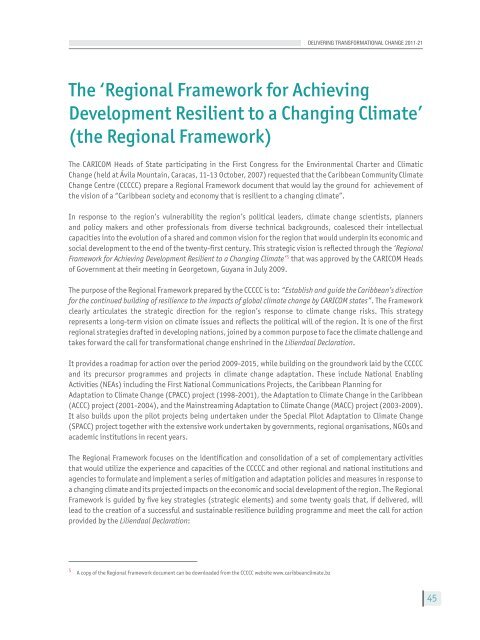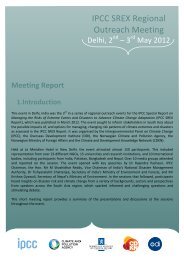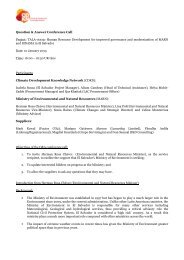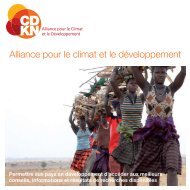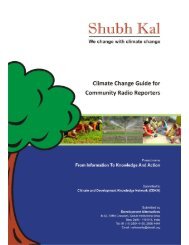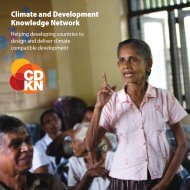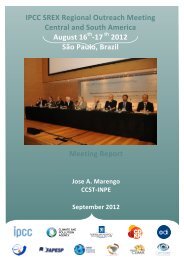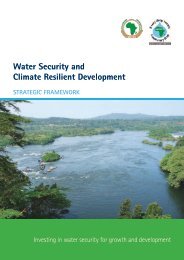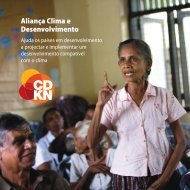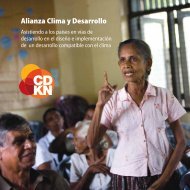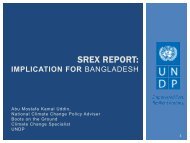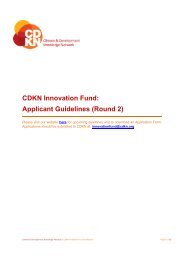Implementation Plan - CDKN Global
Implementation Plan - CDKN Global
Implementation Plan - CDKN Global
- No tags were found...
You also want an ePaper? Increase the reach of your titles
YUMPU automatically turns print PDFs into web optimized ePapers that Google loves.
DELIVERING TRANSFORMATIONAL CHANGE 2011-21The ‘Regional Framework for AchievingDevelopment Resilient to a Changing Climate’(the Regional Framework)The CARICOM Heads of State participating in the First Congress for the Environmental Charter and ClimaticChange (held at Ávila Mountain, Caracas, 11-13 October, 2007) requested that the Caribbean Community ClimateChange Centre (CCCCC) prepare a Regional Framework document that would lay the ground for achievement ofthe vision of a “Caribbean society and economy that is resilient to a changing climate”.In response to the region’s vulnerability the region’s political leaders, climate change scientists, plannersand policy makers and other professionals from diverse technical backgrounds, coalesced their intellectualcapacities into the evolution of a shared and common vision for the region that would underpin its economic andsocial development to the end of the twenty-first century. This strategic vision is reflected through the ‘RegionalFramework for Achieving Development Resilient to a Changing Climate’ 5 that was approved by the CARICOM Headsof Government at their meeting in Georgetown, Guyana in July 2009.The purpose of the Regional Framework prepared by the CCCCC is to: “Establish and guide the Caribbean’s directionfor the continued building of resilience to the impacts of global climate change by CARICOM states”. The Frameworkclearly articulates the strategic direction for the region’s response to climate change risks. This strategyrepresents a long-term vision on climate issues and reflects the political will of the region. It is one of the firstregional strategies drafted in developing nations, joined by a common purpose to face the climate challenge andtakes forward the call for transformational change enshrined in the Liliendaal Declaration.It provides a roadmap for action over the period 2009-2015, while building on the groundwork laid by the CCCCCand its precursor programmes and projects in climate change adaptation. These include National EnablingActivities (NEAs) including the First National Communications Projects, the Caribbean <strong>Plan</strong>ning forAdaptation to Climate Change (CPACC) project (1998-2001), the Adaptation to Climate Change in the Caribbean(ACCC) project (2001-2004), and the Mainstreaming Adaptation to Climate Change (MACC) project (2003-2009).It also builds upon the pilot projects being undertaken under the Special Pilot Adaptation to Climate Change(SPACC) project together with the extensive work undertaken by governments, regional organisations, NGOs andacademic institutions in recent years.The Regional Framework focuses on the identification and consolidation of a set of complementary activitiesthat would utilize the experience and capacities of the CCCCC and other regional and national institutions andagencies to formulate and implement a series of mitigation and adaptation policies and measures in response toa changing climate and its projected impacts on the economic and social development of the region. The RegionalFramework is guided by five key strategies (strategic elements) and some twenty goals that, if delivered, willlead to the creation of a successful and sustainable resilience building programme and meet the call for actionprovided by the Liliendaal Declaration:5 A copy of the Regional Framework document can be downloaded from the CCCCC website www.caribbeanclimate.bz45


